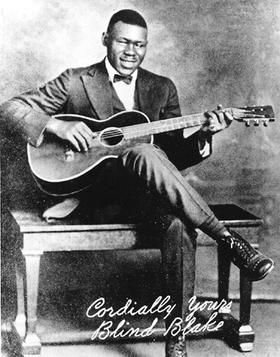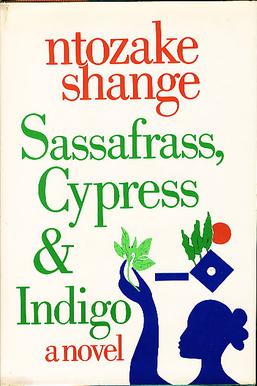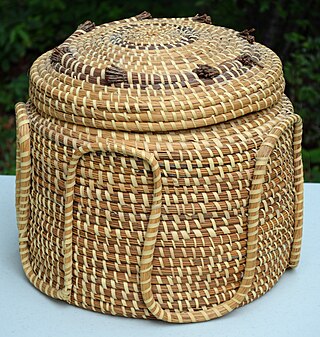
Arthur Blake, known as Blind Blake, was an American blues and ragtime singer and guitarist. He is known for recordings he made for Paramount Records between 1926 and 1932.
Fats or FATS may refer to:
African-American English is the set of English sociolects spoken by most Black people in the United States and many in Canada; most commonly, it refers to a dialect continuum ranging from African-American Vernacular English to a more standard American English. Like all widely spoken language varieties, African-American English shows variation stylistically, generationally, geographically, in rural versus urban characteristics, in vernacular versus standard registers, etc. There has been a significant body of African-American literature and oral tradition for centuries.

Gullah is a creole language spoken by the Gullah people, an African-American population living in coastal regions of South Carolina and Georgia as well as extreme northeastern Florida and the extreme southeast of North Carolina.

The Gullah are an African American ethnic group who predominantly live in the Lowcountry region of the U.S. states of South Carolina, North Carolina, Georgia, and Florida within the coastal plain and the Sea Islands. Their language and culture have preserved a significant influence of Africanisms as a result of their historical geographic isolation and the community's relation to their shared history and identity.
Geeshie Wiley was an American country blues singer and guitar player who recorded six songs for Paramount Records, issued on three records in April 1930. According to the blues historian Don Kent, Wiley "may well have been the rural South's greatest female blues singer and musician". Little is known of her life, and there are no known photographs of her. She may have been born Lillie Mae Boone, later Lillie Mae Scott.
Bajan, or Bajan Creole, is an English-based creole language with African and British influences spoken on the Caribbean island of Barbados. Bajan is primarily a spoken language, meaning that in general, standard English is used in print, in the media, in the judicial system, in government, and in day-to-day business, while Bajan is reserved for less formal situations, in music, or in social commentary. Ethnologue reports that, as of 2018, 30,000 Barbadians were native English speakers, while 260,000 natively spoke Bajan.
In American usage, "Bubba" is a term of endearment mainly given to boys. Being formed from the word "brother", it often indicates that someone is an "older brother".

The terms hipster or hepcat, as used in the 1940s, referred to aficionados of jump blues and jazz, in particular bebop, which became popular in the early 1940s. The hipster subculture adopted the lifestyle of the jazz musician, including some or all of the following features: Conk hairstyles, loose fitting suits with loud colors, jive talk slang, use of tobacco, cannabis, and recreational drugs, relaxed attitude, love for Jazz or Jump blues music, and styles of swing dancing, especially Lindy hop.

Atlantic Creole is a cultural identifier of those with origins in the transatlantic settlement of the Americas via Europe and Africa.
Jive talk, also known as Harlem jive or simply Jive, the argot of jazz, jazz jargon, vernacular of the jazz world, slang of jazz, and parlance of hip is an African-American Vernacular English slang or vocabulary that developed in Harlem, where "jive" (jazz) was played and was adopted more widely in African-American society, peaking in the 1940s.
Curley is a surname, given name, nickname or stage name. It may refer to:

Sassafrass, Cypress & Indigo is a 1982 novel written by Ntozake Shange and first published by St. Martin's Press. The novel, which took eight years to complete, is a story of three Black sisters, whose names give the book its title, and their mother. The family is based in Charleston, South Carolina, and their trade is to spin, weave, and dye cloth; unsurprisingly, this tactile creativity informs the lives of the main characters as well as the style of the writing. Sassafrass, Cypress & Indigo integrates the whole of an earlier work by Shange called simply Sassafrass, published in 1977 by Shameless Hussy Press. As is common in Shange's work, the narrative is peppered with interludes that come in the form of letters, recipes, dream stories and journal entries, which provide a more intimate approach to each woman's journey toward self-realization and fulfillment. The book deals with several major themes, including Gullah/Geechee culture, women in the arts, the Black Arts Movement, and spirituality, among many others.
Duke or The Duke is a nickname of:
Cornelia Walker Bailey was a storyteller, writer, and historian who worked to preserve the Geechee-Gullah culture of Sapelo Island, Georgia.
The Geechee or Gullah are African Americans who live in the Lowcountry region of the U.S. states of Georgia, Florida, and South Carolina.
The Gullah are African Americans who live in the Lowcountry region of the U.S. states of Georgia, Florida, and South Carolina.

The Gullah are African Americans who live in the Lowcountry region of the U.S. states of Georgia, Florida, South Carolina, and North Carolina, in both the coastal plain and the Sea Islands. They developed a creole language, also called Gullah, and a culture with some African influence.






